Published Aug 2, 2012
Catching Up With Frequent Trek Guest Gregory Itzin
Catching Up With Frequent Trek Guest Gregory Itzin
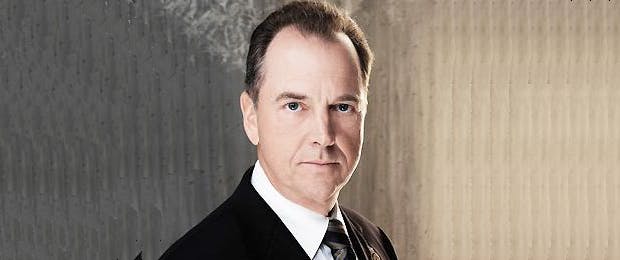
Are you like us? Do you want to hiss at the screen every time you see Gregory Itzin? The man is an all-around talented actor, but he’s especially good at being bad, or at least being in league with the villains of too many movies and television shows to count. He’s best known for his stint as President Charles Logan on 24, but he made five separate visits to the Star Trek universe over the years. He played Ilon Tandro in the “Dax” episode of Deep Space Nine and then returned to that show to portray Hain in “Who Mourns for Mourn?” He was Doctor Dysek in the Voyager hour “Critical Care,” and he guest starred twice on Enterprise, first as Captain Sopek in “Shadows of P’Jem” and later as Admiral Black in “In a Mirror Darkly, Part II.” Itzin remains a busy character actor and still occasionally attends Trek conventions. In fact, he’s on the schedule for Creation Entertainment’s Official Star Trek Convention, which will begin next week in Las Vegas, and we’re pleased that he obliged our request for an interview in advance of the mega-convention.
You appeared in five episodes of Trek, but you were originally hired to play McNary in the Next Generation episode “The Big Goodbye,” which did not work out. What happened?
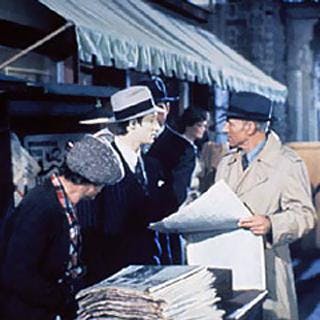
Anyway, this episode became iconic, one of those episodes that people remember. So I didn’t do it and I’ve always regretted that. And I don’t know if this is true or apocryphal or just my own paranoia, but I didn’t get cast in a Star Trek episode for a number of years after that. It seems to me that I didn’t get called in for a bit, and then I got called in again, and then I did my first Deep Space Nine. So I’m glad I did L.A. Law, but I always regret not having been a part of Next Generation. And if everything else had worked out as it did, I would have been one of the few actors who did Next Generation, DS9, Voyager and Enterprise.
Let’s go through your five episodes. Give us a quick anecdote about each one, please, starting with “Dax.”
Itzin: I remember, because it was my first episode, it being very exciting. I got to work with these great actors, some of whom became pretty good friends of mine.
Next up was “Who Mourns for Morn?”…
Itzin: That was a very funny episode. Armin Shimerman and I had a great time. It was very tongue-in-cheek. That one, for me, was mostly a funny character in funny situations, which was a little different from most of the other episodes I did, which were serious undertakings.
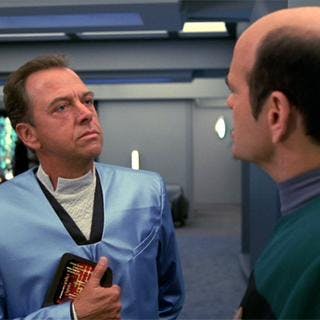
Speaking of serious, you next guest starred in the Voyager episode “Critical Care”…
Itzin: I remember Bob Picardo playing the Doctor very tongue-in-cheek. He always played the character tongue-in-cheek. I remember the contrast between my seriousness and the way he played it. It was also very interesting to work with Larry Drake as the adversary in the thing. I did a play with him, too, actually.
You played the Vulcan Sopek in your first Enterprise episode, “Shadows of P’Jem”…
Itzin: That was fun. I got to play a very odd-looking Vulcan. I just looked weird, with the ears, the blunt cut and the gray hair. I got to wield a big weapon and wave it at Jeff Combs.
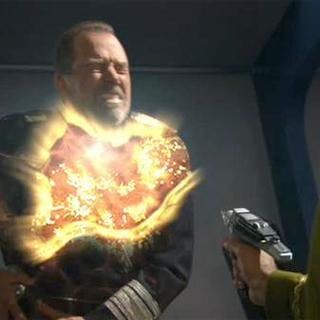
Your last Trek adventure was “In a Mirror Darkly, Part II”…
Itzin: And I got blown away! I got evaporated. That’s an interesting process because you have to pretend like you’re going away, and then the special effects guys take care of the rest of it for you. The thing I want to say is how much I miss this great playground, that Star Trek is missing from television. I grew up watching TV, the westerns, and I acted in a few western sort of things, but Star Trek was a chance to dress up, to play outlandish characters in a fake world that was, at the same time, very real. I think it’s sort of sad that it’s not on anymore, that that experience doesn’t exists anymore for the audience or for the actors who played the roles. It was also a chance… I mean, look, I got to play five different roles. How many shows can you do that on?
One element of your appearances on Trek that surprised us at the time and still surprises us now is that for all five roles you pretty much look like… you.
Itzin: You’re right. I did not have to deal too heavily with the prosthetics. They didn’t disguise me very much. It’s a double-edged sword; let me put it that way. You’re doing Star Trek, and it’s the prosthetics show. So I sort of wanted to be covered up, but – but – friends of mine who did the prosthetics heavily, like Armin, like Jeff Combs and Scott MacDonald, who did the lizard character and was covered all over, all said how incredibly uncomfortable it was. If you’re given to paranoia or insecurity by having that stuff on, it could be quite frightening. So I never had it on, and I just accepted the parts I was asked to play and went ahead and played them. I don’t know why they didn’t hide me.
What are you up to these days?
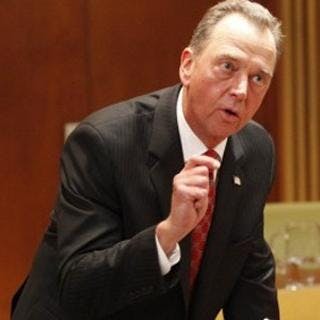
You’ll be attending Creation’s big Star Trek convention next week. How often have you been to conventions in the past, and what do you enjoy most about the experience?
Itzin: I used to do them more regularly. I didn’t do them for a while. I thought, “Well, this is silly.” Armin helped me get my mind right around them. I felt like I was just selling something, just selling my wares. Armin said, “The Star Trek experience is so much different than any other sci-fi. There are all kinds of people in the universe and everybody is welcome. There are no oddities. You’re not stealing from the people who come. They come because they want to be a part of this world and it’s a very special place for them.”
The experience… I did the parts so long ago that I start forget these things. I remember the characters’ names and who they were, but people will come and ask the most intricate questions about the episodes. “What was it like when you did…?” and I’ll have no idea what they’re talking about. These people are devoted and are huge fans, and it’s quite amazing. They’ll see you on Star Trek and be quite familiar with what you’ve done, and they’ll follow what you’ve done beyond that. One is tempted to say “Get a life,” but this is part of their life. So it becomes very nice. It’s a warm experience.

